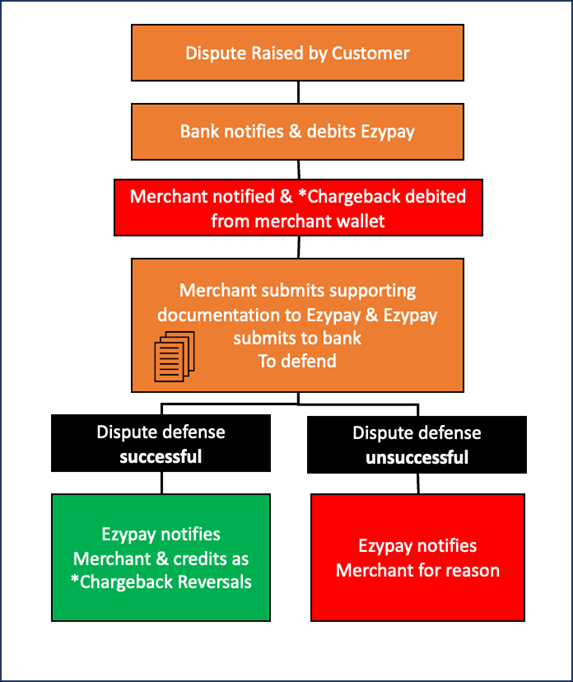Chargeback Common Questions
Chargeback process

- Ezypay is notified by the banking institution of a dispute.
- A credit note is created indicating the chargeback.
- The disputed amount is deducted from the merchant’s settlement.
- The merchant provides supporting evidence.
- Ezypay forwards the evidence to the bank.
- The bank decides the outcome.
- Ezypay informs the merchant of the outcome.
ImportantMerchants should respond to Ezypay with the supporting documentation/ evidence in a timely manner. We only has a specific time frame (varies from banking institutions) to help merchants defend the dispute.
Reasons for a chargeback
Customers may dispute a payment for reasons such as:
- Unrecognised transactions or merchants.
- Incorrect or duplicate charges.
- Goods/services not delivered or not as described.
- Unauthorised or fraudulent payments.
- Recurring payments after cancellation.
Ways to reduce chargebacks
To minimize disputes:
- Inform customers that Ezypay handles billing.
- Clearly explain costs, including fees.
- Ensure customer consent for payments.
- Maintain records of provided goods or services.
Ezypay has requested for 9 mandatory items to be integrated. This includes the 'Acceptance of Ezypay's Terms and Conditions' and 'Acceptance of Ezypay's fees', to ensure that a customer acknowledges Ezypay is handling the payment and aware of extra fees. These can be used as supporting evidence for chargeback disputes.
Supporting documents for disputes
To defend a disputes, the more evident that we can provide, the better the outcome will be. Partner should consider the evidence is readily available to their merchant in case of dispute. Typical documentation for defending a chargeback includes:
Evidence Required by Bank | Example Documentation |
|---|---|
Approval of debiting the payment method | Signed Direct Debit Authority form |
T&C's agreed by customer | Signed Membership Agreement form |
Customer receiving the services | System log of customer accessing merchants' facility. |
Merchant already processed a refund | Copy of refund issued |
A record of previous non-disputed payment | A list of transactions that has taken place from the customer |
Updated 3 months ago